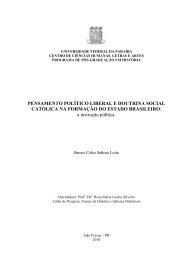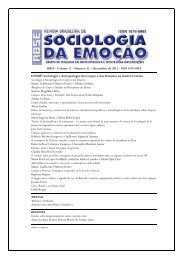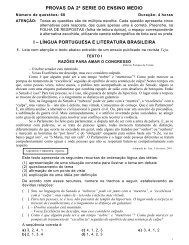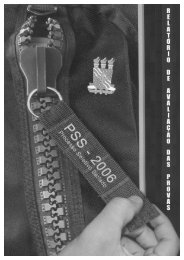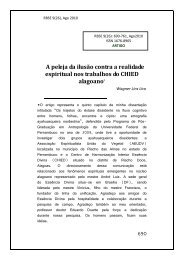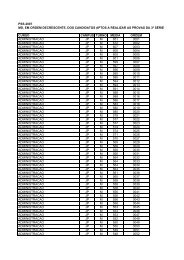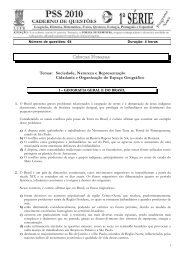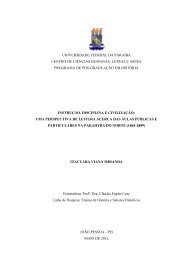abril de 2004 - CCHLA - Universidade Federal da ParaÃba
abril de 2004 - CCHLA - Universidade Federal da ParaÃba
abril de 2004 - CCHLA - Universidade Federal da ParaÃba
Create successful ePaper yourself
Turn your PDF publications into a flip-book with our unique Google optimized e-Paper software.
Generated by Foxit PDF Creator © Foxit Softwarehttp://www.foxitsoftware.com For evaluation only.alienation and separation. Love, a positive term, can beapplied even to dysfunctional relationships such aspathological <strong>de</strong>pen<strong>de</strong>ncy ("My husband beats me andmolests the kids, but I can’t leave because I love him toomuch"). Similarly, there are literally hundreds of wordsthat hi<strong>de</strong> shame/embarrassment. ("It was an awardmoment for me"). Retzinger (1991; 1995), drawing uponthe sizeable research literatures on anger and onshame/embarrassment, has established classes ofvernacular words ("cue words") that are used to refer to(and mask) the two emotions.The English language version of the shame tropehas produced chaos in emotion research. Katz’s volume(1999) on emotions is extraordinarily insightful in itstreatment of anger and grief (crying), but his original,elaborate <strong>de</strong>finition of shame lies well within thevernacular i<strong>de</strong>a of shame as a conscious, painful emotionof crisis (Scheff 2002).Another instance can be found in Jasper’s (2003)division of feelings into four categories: reflex emotions,affects, moods, and complex moral emotions. There is noproblem with the first three classes, but the fourth isprobably gratuitous. Jasper inclu<strong>de</strong>s anger, fear, joy,sadness (grief), disgust, and surprise as universal,genetically based reflex emotions. Following Ekman’searly work, Jasper exclu<strong>de</strong>s shame. But Ekman hasrecanted, including shame as a universal emotion(1998) [4] . The complex moral feelings that Jasper refers toinclu<strong>de</strong> shame as a component, but also have cognitiveand social components.Finally, it’s worthwhile to note that Oatley andJenkins’ (1995) broad approach to the psychology ofemotions, the industry stan<strong>da</strong>rd, inclu<strong>de</strong>s manydiscussions of shame, but offers no <strong>de</strong>finition. It’s tooearly to say which version of the meaning of shame willbe most helpful in advancing knowledge. But it is at leastclear that in this early stage of human science research onemotions, we are in a state bor<strong>de</strong>ring on anarchy.Self-esteem as a TropeThe enormous corpus of studies based on selfesteemscales suggests a consequence of the narrownessof the shame trope in English (Scheff and Fearon, <strong>2004</strong>).121



